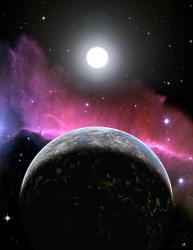 Are we alone in the Universe? We won’t know until we really start looking for life around other stars… or listening for it.
Are we alone in the Universe? We won’t know until we really start looking for life around other stars… or listening for it.
Continue reading “Listening for ET”
First Triple Quasar Discovered
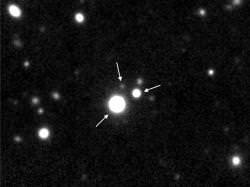 Quasars are some of the brightest objects in the Universe, beaming radiation across billions of light-years of space. Although they were a mystery for many years, astronomers now believe they’re the bright radiation from matter clogging up around an actively feeding supermassive black hole.
Quasars are some of the brightest objects in the Universe, beaming radiation across billions of light-years of space. Although they were a mystery for many years, astronomers now believe they’re the bright radiation from matter clogging up around an actively feeding supermassive black hole.
Continue reading “First Triple Quasar Discovered”
Gas Giants Turn Up Early After Star Formation
 New research indicates that gas giants, like Jupiter and Saturn, form quickly after their stars do. In fact, they probably form within the first 10 million years of a star’s life, or else they never form at all.
New research indicates that gas giants, like Jupiter and Saturn, form quickly after their stars do. In fact, they probably form within the first 10 million years of a star’s life, or else they never form at all.
Continue reading “Gas Giants Turn Up Early After Star Formation”
Even Dwarf Galaxies Have Supermassive Black Holes
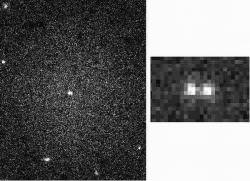 To form a supermassive black hole, you’d think it takes a really large galaxy, like the Milky Way or Andromeda. But it appears that these monsters can form at the heart of plain old dwarf galaxies too.
To form a supermassive black hole, you’d think it takes a really large galaxy, like the Milky Way or Andromeda. But it appears that these monsters can form at the heart of plain old dwarf galaxies too.
Continue reading “Even Dwarf Galaxies Have Supermassive Black Holes”
What’s Up this Week: January 8 – January 14, 2007
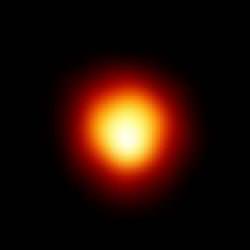
Greetings, fellow SkyWatchers! It’s time to take on the Hunter as we have a look at the Orion region for the unaided eye, binoculars and telescope. From Project Diana to the mightly Betelgeuse, it’s time to head for the stars because…
Here’s what’s up!
Monday, January 8 – On this day in 1942 – precisely 300 years after the death of Galileo, Stephen Hawking was born. The British theoretical astrophysicist, despite his physical limitations, became one of the world’s foremost leaders in cosmological theory and his book “A Brief History of Time” remains one of the best written on the subject.Also born on this day in 1587 was Johannes Fabricius, son of the discoverer of variable star Mira, David Fabricius. Like many father and son teams, the pair went on to study astronomy together, and some of their most frightening work dealt with viewing sunspots through an unfiltered telescope – a practice which eventually blinded Galileo!
Continue reading “What’s Up this Week: January 8 – January 14, 2007”
Podcast: Black Holes Big and Small
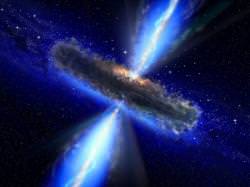 We’re finally ready to deal with the topic you’ve all been waiting for: Schwarzschild swirlers, Chandrasekhar crushers, ol’ matter manglers, sucking singularities… you might know them as blackholes. Join as as we examine how black holes form, what they consume, and just how massive they can get.
We’re finally ready to deal with the topic you’ve all been waiting for: Schwarzschild swirlers, Chandrasekhar crushers, ol’ matter manglers, sucking singularities… you might know them as blackholes. Join as as we examine how black holes form, what they consume, and just how massive they can get.
Continue reading “Podcast: Black Holes Big and Small”
Please Digg the Astronomy Cast Podcast
 Hi folks, if you’re a member of the popular social networking site Digg.com, I was wondering if you could take a second and “Digg” our Astronomy Cast podcast. That will help us rise in the rankings of Digg.com, and get more publicity. If you’re a member of Digg.com, you can access the page here: digg.com/podcasts/Astronomy_Cast
Hi folks, if you’re a member of the popular social networking site Digg.com, I was wondering if you could take a second and “Digg” our Astronomy Cast podcast. That will help us rise in the rankings of Digg.com, and get more publicity. If you’re a member of Digg.com, you can access the page here: digg.com/podcasts/Astronomy_Cast
Continue reading “Please Digg the Astronomy Cast Podcast”
Mars Rovers Learn Some New Tricks
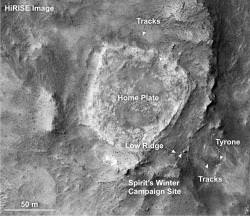 Consider this for a moment. NASA’s Mars Exploration rovers are nearing their third anniversary of crawling around the surface of Mars. Spirit arrived on January 3rd, 2004, and Opportunity showed up 21 days later. And they were only supposed to be usable for a few months.
Consider this for a moment. NASA’s Mars Exploration rovers are nearing their third anniversary of crawling around the surface of Mars. Spirit arrived on January 3rd, 2004, and Opportunity showed up 21 days later. And they were only supposed to be usable for a few months.
Continue reading “Mars Rovers Learn Some New Tricks”
Blue Origin’s Rocket is Finally Revealed
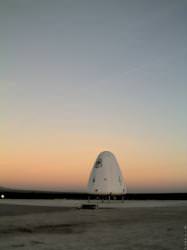 It’s been a huge secret for several years. Amazon.com’s founder Jeff Bezos has a rocket company on the side called Blue Origin. But that’s pretty much all we knew.
It’s been a huge secret for several years. Amazon.com’s founder Jeff Bezos has a rocket company on the side called Blue Origin. But that’s pretty much all we knew.
Continue reading “Blue Origin’s Rocket is Finally Revealed”
Black Hole Found in a Globular Star Cluster
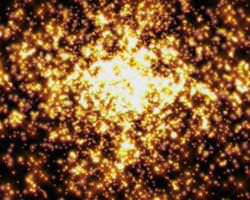 Stellar mass black holes have been discovered, and astronomers now believe that supermassive black holes exist at the centres of most galaxies. But now a black hole has been discovered inside a globular star cluster. This could be one of the elusive “intermediate-mass” black holes.
Stellar mass black holes have been discovered, and astronomers now believe that supermassive black holes exist at the centres of most galaxies. But now a black hole has been discovered inside a globular star cluster. This could be one of the elusive “intermediate-mass” black holes.
Continue reading “Black Hole Found in a Globular Star Cluster”
